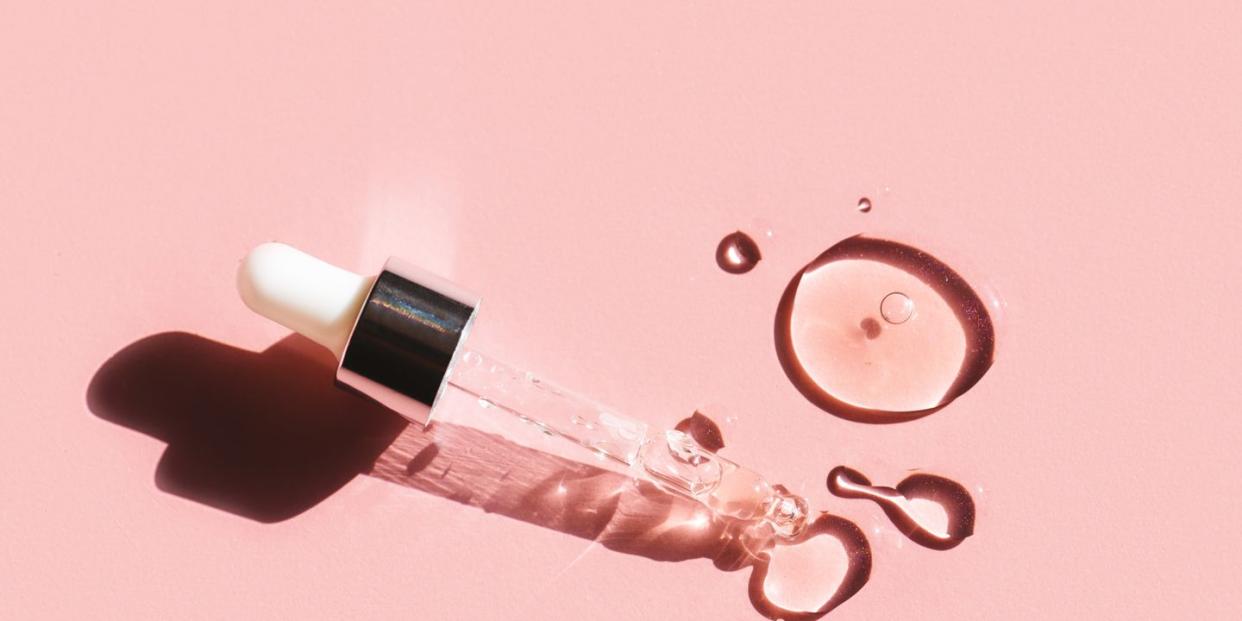Everything You Need to Know About PHAs, the Gentlest Chemical Exfoliant for Sensitive Skin

You may have heard that one of the best ways to get glowing, radiant skin is through regular exfoliation. But if you have sensitive skin — and especially if you're prone to rosacea or eczema — you might find that chemical exfoliators like alpha-hydroxy acids (AHAs) and beta-hydroxy acids (BHAs) can be too harsh.
But there's a buzzy new chemical exfoliator on the scene that could be the answer to all your clear-skin prayers: Say hello to polyhydroxy acids (PHAs). For people with sensitive skin, these acids are a skincare game-changer. We talked to Mara Weinstein Velez, M.D., F.A.A.D., a dermatologist based in Rochester, NY, to get the lowdown on this trendy ingredient.
What exactly are PHAs?
Polyhydroxy acid is a gentle chemical exfoliant. The most common PHAs are gluconolactone, galactosen and lactobionic acid. PHAs exfoliate dead skin cells from the surface, which helps skin be smoother and more even.
How are PHAs different from AHAs and BHAs?
"PHAs can be considered a second generation of AHAs," Dr. Weinstein says. "The main difference is the size of the molecule. PHAs have a larger molecule and therefore don’t penetrate as deeply as an AHA when applied to the skin. [That makes them] less irritating and better for sensitive skin."
Are PHAs good for skin?
With regular use, PHAs can lead to brighter, smoother, more hydrated skin and an overall enhanced glow. "Polyhydroxy acids are wonderful because they are something you can use at home regularly to chemically exfoliate the skin without undergoing any major procedures," says Dr. Weinstein. "They are low-cost and offer anti-aging benefits."
Who should use PHAs?
Virtually anyone can use PHAs, but those with sensitive skin may get the most benefit from, since they likely won't cause irritation like other chemical exfoliants or face peels might. "They also have a hydrating quality, so in addition to exfoliating, they will help with hydration which is especially important with sensitive skin," says Dr. Weinstein. PHAs are also gentle enough to be used during pregnancy, and they're perfect for acne-prone skin, as they help even out texture and tone. Try Dr. Jart's Dermaclear Micro Water if you're looking to treat acne.
What types of PHAs are best?
Often, these PHAs are mixed together in products, so you can't go wrong — particularly if you're looking for an exfoliator for sensitive skin.
Gluconolactone: The most popular of the PHAs, gluconolactone not only works to exfoliate your skin, it also hydrates and may offer some antioxidant benefits.
Lactobionic acid: An oxidized form of milk, this acid works as both an exfoliator and a humectant, meaning it helps your skin retain moisture.
Galactose: This PHA may sound familiar to you — that's because it's the sugar found in milk. This one is a bit less common than the other two, but it works to exfoliate your skin just as gently.
How often should you use PHAs?
In general, you can safely use PHAs three to four times a week, since they are more gentle than other acids. Keep in mind, the right amount depends on your individual skin type. "I always recommend starting slow and increasing as tolerated, which might look like starting twice a week, then increasing to three times a week and eventually every other day, if possible," Dr. Weinstein says.
Is it safe to use PHAs with ingredients like vitamin C or retinol?
Polyhydroxy acids play nicely with other active ingredients. PHAs can easily be incorporated into a routine that already includes products containing vitamin C or retinol — but again, be sure to start slowly to make sure there's no irritation. You can even try a serum like Herbivore's Bakuchiol, which is a gentle retinol alternative formulated with PHAs. Always layer your skincare products from thinnest to thickest, and wait for each product to dry before applying the next one.
Are there any side effects to PHAs?
"That’s the wonderful thing about PHAs — the side effects are minimal, and they’re very well tolerated," Dr. Weinstein says. When you first start using an acid, you can expect a small amount of irritation, according to Dr. Weinstein. "Major irritation in the way of increased and persistent redness, peeling and perhaps some itching should indicate that the product is too harsh or should be used less often," she says. Watch your skin carefully for signs that you should scale back on use, and only use once a week if you have other acids in the mix (like AHAs or BHAs).
You Might Also Like


